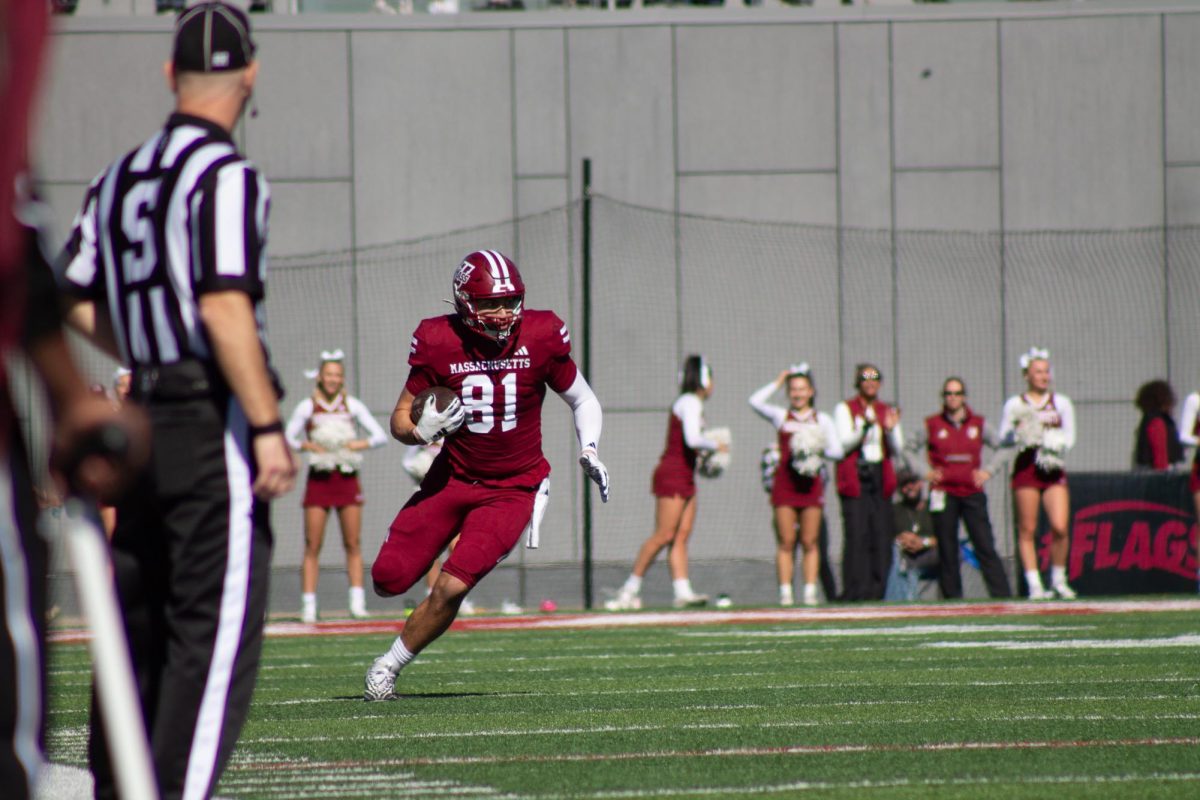
Prospective University of Massachusetts students interested in jobs within the field of intercollegiate athletics are entering the job market during one of the field’s most pivotal time periods in history.
On Wednesday, the University hosted the man who leads one of its intercollegiate athletics’ most important entities.
The Mark H. McCormack School of Sport Management hosted Southeastern Conference commissioner Mike Slive this week as its Executive-in-Residence, marking the first time a commissioner or college athletics executive fulfilled that role.
The 73-year old spoke for over an hour in front of students at Mahar Auditorium, sharing stories from his career and answering Twitter questions tweeted in from fans watching the live-streamed event from home.
The SEC is the pinnacle of collegiate football success, as teams from within the conference have won seven of the last eight college football championships. During Slive’s tenure, the SEC won 62 national championships in 16-of-21 league sponsored sports.
Slive discussed issues he faced in the past as well as issues he anticipates facing in the future.
“This is a very, very pivotal period in intercollegiate athletics,” Slive said just minutes into his address.
One of the pressing issues in college athletics is the treatment of players, specifically in terms of compensation and wellness. Recently, football players from Northwestern University began the process of unionizing in order to be treated as employees, not just student-athletes. Slive maintained that the NCAA can improve its treatment of players without necessarily paying them as employees, saying he’s committed to maintaining the collegiate model.
“I don’t think we should have (players as) employees,” Slive said. “To me, the focus is really on the substance. What do we need to do for these student-athletes to maintain the collegiate model, in light of the request to unionize?”
Slive noted that he hopes scholarships, which cover the full costs of college attendance, can be introduced to student-athletes. He also hopes to improve the time commitment required for student-athletes who must find balance between playing a sport and completing schoolwork.
He also spoke on his ability to add diversity to the SEC, calling it one of his proudest achievements. Slive – who became commissioner in 2002 – headed the conference in 2004 when Mississippi State hired Sylvester Croom, the first African-American head coach in the conference. Slive called it a “historic moment.”
Diversity has been a resounding topic at UMass this week, as basketball guard Derrick Gordon became the first male Division I basketball player to announce he was gay last Wednesday. Gordon cited former SEC football player Michael Sam, who also came out earlier this year, as a crucial inspiration to him.
“I issued a statement on Michael Sam in saying that it was a courageous thing to do in support of him as a student-athlete, and I think the same would apply for (Gordon),” Slive said.
Slive also oversaw the SEC’s expansion at a conference in 2011, when the conference announced Texas A&M would become a member the following season. Shortly thereafter, the conference also announced Missouri would enter as a member, pushing the total number of schools to 14.
He called the process “complex, intense, exhausting and fascinating.”
The expansion increased overall viewership of the conference, allowing the SEC to pursue avenues of exposure and financial security. The conference recently announced its own television network, the SEC Network, which will run in conjunction with ESPN and is scheduled to launch in August 2014.
Slive also gave advice on leadership and what students need to know about innovation as they prepare to enter the workforce. He detailed his job history, starting at how he began as a meat-cutter in a butcher shop before practicing law. Ultimately, following advice from his wife, he took a risk and moved to California to work for the Pacific-10 Conference.
“If you have a dream, follow your dream,” Slive said as he shared his wife’s advice.
The presentation centered around the idea that SEC entered its “Golden Age” because preparation met opportunity. Slive listed characteristics he felt all students should embody as being willing to take risks, make sacrifices, be willing to move, have patience, be open to the unknown and ultimately, be confident.
“Confidence is grounded in competence,” Slive said. “Both are necessary to be a leader.”
Mark Chiarelli can be reached at [email protected] and followed on Twitter @Mark_Chiarelli.


















